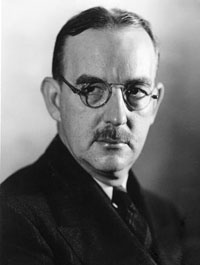Joseph Wood Krutch facts for kids
Quick facts for kids
Joseph Wood Krutch
|
|
|---|---|
 |
|
| Born | November 25, 1893 |
| Died | May 22, 1970 (aged 76) |
| Nationality | American |
| Education | University of Tennessee Columbia University |
| Occupation |
|
| Known for |
|
Joseph Wood Krutch (born November 25, 1893 – died May 22, 1970) was an American writer. He was also a critic and a naturalist. A naturalist is someone who studies nature.
Krutch wrote many books about nature, especially about the American Southwest. He is known for his special way of thinking called pantheistic philosophy. This means he believed that God is in everything in nature.
Contents
Joseph Wood Krutch's Life Story
Joseph Wood Krutch was born in Knoxville, Tennessee. He went to the University of Tennessee. Later, he earned a Ph.D. in English literature from Columbia University.
After serving in the army in 1918, he traveled. He spent a year in Europe with his friend, Mark Van Doren. After World War I, he taught English at Brooklyn Polytechnic.
In 1924, Krutch started working as a theater critic. He wrote reviews for a magazine called The Nation. He kept this job until 1952.
As a writer, Krutch became famous in 1929. This was when he published his book The Modern Temper. In this book, he questioned popular ideas about science. He thought that science could sometimes lead to a sad view of human life.
In the 1940s, he wrote popular books about Samuel Johnson and Henry David Thoreau. Thoreau was a famous naturalist. Inspired by Thoreau, Krutch wrote his first nature book. It was called The Twelve Seasons (1949).
From 1937 to 1952, he was an English professor. He taught at Columbia University. Students really liked his lectures. In 1955, Krutch won the National Book Award. This was for his book The Measure of Man (1954). In this book, he changed his earlier sad views a bit. He argued that humans have special qualities. These include reason, thinking, free will, and moral judgment. He believed science could not fully explain these things.
In 1952, Krutch moved to Tucson, Arizona. He moved partly because of his health. In Arizona, he wrote many books about nature. These books covered topics like ecology and the desert environment. He also wrote about the Grand Canyon. He became well-known as a naturalist and an early conservationist.
Like Aldo Leopold, Krutch believed in protecting nature. He thought people should value nature for its own sake. It wasn't just about what nature could do for humans.
In his 1956 book, The Great Chain of Life, he wrote a famous line. In a chapter called "The Vandal and the Sportsman," he said: "When a man wantonly destroys one of the works of Man we call him Vandal. When he wantonly destroys one of the works of God we call him Sportsman". This quote shows his strong feelings about protecting nature.
Krutch developed a pantheistic philosophy. This means he felt a deep connection to nature. He believed that everything in nature was part of a greater whole. Historian Donald Worster said Krutch "became a kind of pantheist or ethical mystic." He felt joy in being part of something bigger than himself.
Joseph Wood Krutch's Family
Joseph Wood Krutch had a brother named Charles Krutch. Charles was a famous photographer for the Tennessee Valley Authority (TVA). His uncle, Charles Christopher Krutch, was a painter. He was known for his beautiful paintings of the Smoky Mountains.
Joseph Wood Krutch's Death
Joseph Wood Krutch died on May 22, 1970. He was 76 years old. He passed away in Tucson, Arizona, from colon cancer.
One of his last interviews was with Edward Abbey. This interview can be found in Abbey's 1988 book, One Life at a Time, Please.
Joseph Wood Krutch's Legacy
Many of Krutch's writings are kept at the University of Arizona. The Joseph Wood Krutch Cactus Garden was named in his honor in 1980.
When he died, The New York Times praised him. They said that young Americans concerned about the environment should read his books. They believed his books would bring "delight to themselves and profit to the world."
See also
 In Spanish: Joseph Wood Krutch para niños
In Spanish: Joseph Wood Krutch para niños
 | Anna J. Cooper |
 | Mary McLeod Bethune |
 | Lillie Mae Bradford |

